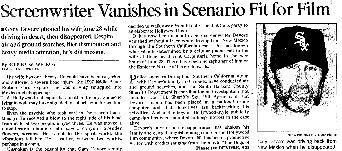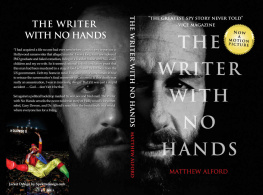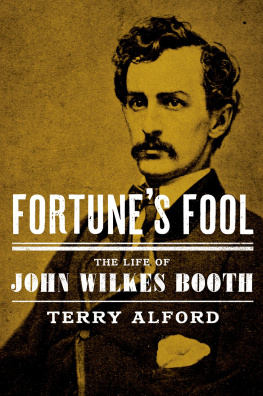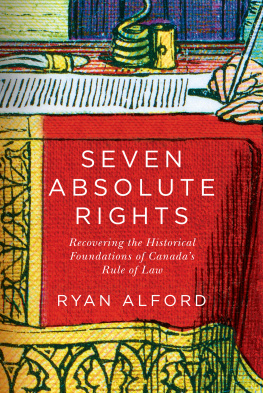Alford - The Writer with No Hands
Here you can read online Alford - The Writer with No Hands full text of the book (entire story) in english for free. Download pdf and epub, get meaning, cover and reviews about this ebook. year: 2016, genre: Detective and thriller. Description of the work, (preface) as well as reviews are available. Best literature library LitArk.com created for fans of good reading and offers a wide selection of genres:
Romance novel
Science fiction
Adventure
Detective
Science
History
Home and family
Prose
Art
Politics
Computer
Non-fiction
Religion
Business
Children
Humor
Choose a favorite category and find really read worthwhile books. Enjoy immersion in the world of imagination, feel the emotions of the characters or learn something new for yourself, make an fascinating discovery.
- Book:The Writer with No Hands
- Author:
- Genre:
- Year:2016
- Rating:5 / 5
- Favourites:Add to favourites
- Your mark:
- 100
- 1
- 2
- 3
- 4
- 5
The Writer with No Hands: summary, description and annotation
We offer to read an annotation, description, summary or preface (depends on what the author of the book "The Writer with No Hands" wrote himself). If you haven't found the necessary information about the book — write in the comments, we will try to find it.
Alford: author's other books
Who wrote The Writer with No Hands? Find out the surname, the name of the author of the book and a list of all author's works by series.
The Writer with No Hands — read online for free the complete book (whole text) full work
Below is the text of the book, divided by pages. System saving the place of the last page read, allows you to conveniently read the book "The Writer with No Hands" online for free, without having to search again every time where you left off. Put a bookmark, and you can go to the page where you finished reading at any time.
Font size:
Interval:
Bookmark:
Copyright Matthew Alford, 2016. All rights reserved. First published in the United Kingdom by Matthew Alford, 2016. This version published in the United Kingdom, 2016. All rights reserved. No part of this document may be reproduced or transmitted in any form or by any means, electronic, mechanical, photocopying, recording, or otherwise, without prior written permission of Matthew Alford.
THE WRITER WITH NO HANDS
By Matthew Alford
Copyright Matthew Alford, 2016. All rights reserved.
Authors on sensitive topics sometimes will say, This story can only be told through fiction or, more pretentiously, Everything in here is true because I made
it up myself.
I am not doing that.
I have done my best. The book is written in such a way as to reduce the chances of my being killed or inconvenienced.
Matthew Alford
Winter 2015/16
Contents:
- Strange Mirrors
- Tramps and Thieves
- Clowns and Cowboys
- Roll up, roll off
- Pirates and Emperors
- Away with the Circus
Acknowledgements
Thank you to all my friends and family - you know who you are, and to the fantastic little cast and crew for the film series. Also, specifically for their help with the book, I dont want these people to feel forgotten: Susanna Mountcastle; Laura Fearns; Zebedee Bear; Mack White; Tamla Bear; Rose Jeremiah; Sam Walker; Paul Matthew; Tanya Surtees; Bob Sketchley; Andy Nunn (for the vitamins); Simon Capes; Dan Broudy; Polly Dalton; Chris Masters; Matthew Zuckerman; Brett Edwards; Becky, Pauline and Dave Sarll. Welcome to everybody at facebook.com/thewriterwithnohands
M.A
A Note on the Characters
If this were a fictional novel, for simplicitys sake I would greatly reduce the number of characters, especially since many of them are of a similar age and gender (old, male Americans). This has obviously not been possible, so here I highlight the main and recurrent individuals.
Wendy Devore - Widow of the deceased
Michael Sands - Publicist of the deceased
Will Westaway - A young British film director
Dr Posey, Dr Byrd, Dr Sweet The three private coroners, who are pretty much interchangeable
Frank White House National Security adviser, 1980-1990
Dennis OKeefe A private investigator who thinks Gary Devore died in a car accident
Don Crutchfield A private investigator who thinks Gary Devore was the victim of a government conspiracy
I. Strange Mirrors
D o you ever have those moments when your life feels like a movie? A sudden traumatic self-consciousness, and a curiously pleasurable sense of seeing yourself hurtling through some kind of monstrous set of events without control of your own fate.
I had those moments. But they lasted for long periods of time bursts of weeks and months - spanning across several years.
Then it was suddenly all over.
I first encountered the Devore case whilst writing a feature article for the United Kingdoms (UK) Guardian newspaper about the CIAs involvement in Hollywood.
Gary Devore - the Hollywood screenwriter who had written blockbusting movies for the likes of 80s mega-stars Arnold Schwarzenegger, Christopher Walken, and Kurt Russell - had disappeared in June 1997.
Just vanished. Taken by the Mojave Desert, with his vehicle, as though they both had been evaporated by the beating summer sun.
Then, over a year later, a self-styled, unemployed amateur detective whod been following the news reports of Garys demise conjured up a freakishly lucky deduction about what had happened. The detective theorised that Gary had flipped some road barriers whilst driving over the California Aqueduct and then died in the water. This man, then unknown to police or press, located some pieces of plastic on the side of the aqueduct that he matched to Garys missing Ford Explorer and he alerted the authorities.
Divers were dispatched to the area. Garys car and his decomposed remains, still dressed in his signature cowboy gear, were sitting inside, and all were exhumed.
The find was miraculous in its own right: Garys disappearance was big news in California and the police and public had swarmed the region during the search, including all around the aqueduct.
However, upon further reflection, the accident explanation seemed all the more peculiar. Unless Gary had driven past the aqueduct bridge and then inexplicably turned back around and driven against oncoming traffic, there was no conceivable way for him to have driven into that stretch of water without smashing through a road barrier. But no one ever found any sign of impact. Not even the skid mark of a tyre on the road.
It was as though Garys car had been beamed up by a flying saucer and then beamed back down again.
It was actually my new friend and co-writer on the Guardian article, Robbie Graham, also working out of his bedroom, who found Garys case first. He had read what was then the only coherent, albeit brief and incomplete, summary of the alternative explanation the conspiracy theory.

Fig 1.1 An early Los Angeles Times article, July 27 th 1997.
Of course, there had been dozens of articles in the Californian press detailing Garys disappearance and discovery but Alex Constantine, several years later, was the first to put it out there plain and simple.
Bottom line. Gary disappeared in mysterious circumstances just hours after he had completed work on a script for a major Hollywood film that was very hostile to the US national security apparatus. As such, there were grounds to consider the possibility of a government assassination.
Case open.
Robbie and I attained some corroboration for the conspiracy story by reading the website of a private investigator, Don Crutchfield, who also called the circumstances suspicious.
Crutchfield had highlighted the fact that Garys anti-war screenplay was written on his laptop. That laptop, a box of floppy disks, as well as a gun he always carried on long journeys, had mysteriously vanished from his vehicle, even whilst smaller, lighter items such as a pewter vase that Gary was bringing home as a present for his wife were found in the vehicle undisturbed by the aqueducts current washing through the car.
We didnt say too much about it though. The Gary Devore story added a touch of speculative drama to our Guardian piece but we didnt want it to detract from our main argument that the Central Intelligence Agency commonly known as the CIA far from being out of the shadows since formalising its relationship with Hollywood studios in the 1990s, and therefore open, had in fact reinvigorated its propaganda role.
The CIA was supposed simply to offer technical advice to Hollywood screenwriters, but my suspicions were heightened after my acquiring, from a private archive, a never seen interview with a CIA officer. The man, who I dubbed Mr. X, had characterised his organisations PR apparatus as full of braggards who were widely disliked in the entertainment media and whose activities were possibly illegal. Quite what this meant was never clear but it certainly was apparent that the CIA had been hugely instrumental in the generation of films like The Recruit , The Sum of All Fears , and fawning TV series like The Agency . Hollywoods attitude to the spooks had softened considerably since the days of 1970s cinematic paranoia in classic films like Three Days of the Condor , in which the CIA is presented as sinister murderers.
Yet the Gary Devore story itself seemed dead. No one had paid any attention for ten years. In fact, I noticed that the widow, Wendy Oates-Devores final recorded statements in the online press, way back in 1999, suggested she was grateful to law enforcement and was actually considering suing, not the CIA, but the Highways Agency for making such an inexplicably dicey piece of road. The accident was as official as could be.
Next pageFont size:
Interval:
Bookmark:
Similar books «The Writer with No Hands»
Look at similar books to The Writer with No Hands. We have selected literature similar in name and meaning in the hope of providing readers with more options to find new, interesting, not yet read works.
Discussion, reviews of the book The Writer with No Hands and just readers' own opinions. Leave your comments, write what you think about the work, its meaning or the main characters. Specify what exactly you liked and what you didn't like, and why you think so.








